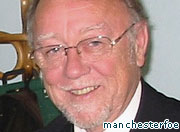A controversial technique which would create three-parent babies has been criticised as a “eugenic” practice and “incompatible with human dignity” by members of the Council of Europe.
A group of eight British MPs and Peers, along with 26 other European politicians, signed a declaration saying the technique is against international law.
In the UK, the Government has backed moves to allow scientists to take genetic material from three or four adults to create a child.
Vote
Politicians have to vote on the technique next year before it can become law in the UK, with supporters saying the technique would help avoid mitochondrial disease passed on from mother to child.
But the written declaration, signed by MPs including Labour’s Jim Dobbin and Tory MP Edward Leigh, said that using external genetic information to modify an embryo is a “eugenic practice”.
The statement said: “The undersigned members of the Parliamentary Assembly affirm that the creation of children with genetic material from more than two progenitor persons, as is being proposed by the United Kingdom Human Fertilisation and Embryology Authority, is incompatible with human dignity and international law.”
Damaged
Mr Dobbin told The Daily Telegraph that to try this in humans at this stage “is not very clever” because it has not been “100 per cent successful” on animals.
Leading international science journal Nature published an article earlier this year which said the technique could result in putting a “high-tech eugenic social dynamic into play”.
The article was written by Marcy Darnovsky, head of the Center for Genetics and Society in California – a public affairs group that encourages responsible use of human genetic technologies.
Engineering
She said the entire international community holds that genetic-engineering tools “should not be used to modify gametes or early embryos and so manipulate the characteristics of future children”.
She also pointed out that many secular scientists and bioethicists have voiced “grave and detailed concerns” about the safety of the technique, and about allowing the “intentional genetic modification of children and their descendants”.
Dr David King, director of campaign group Human Genetics Alert, said the practice “will eventually lead to a eugenic designer baby market”.
But Professor Doug Turnbull, who is leading research on the technique, said: “This is good example where the needs of patients has been carefully considered alongside the ethical aspects and the UK government should move forward with the legislation.”

